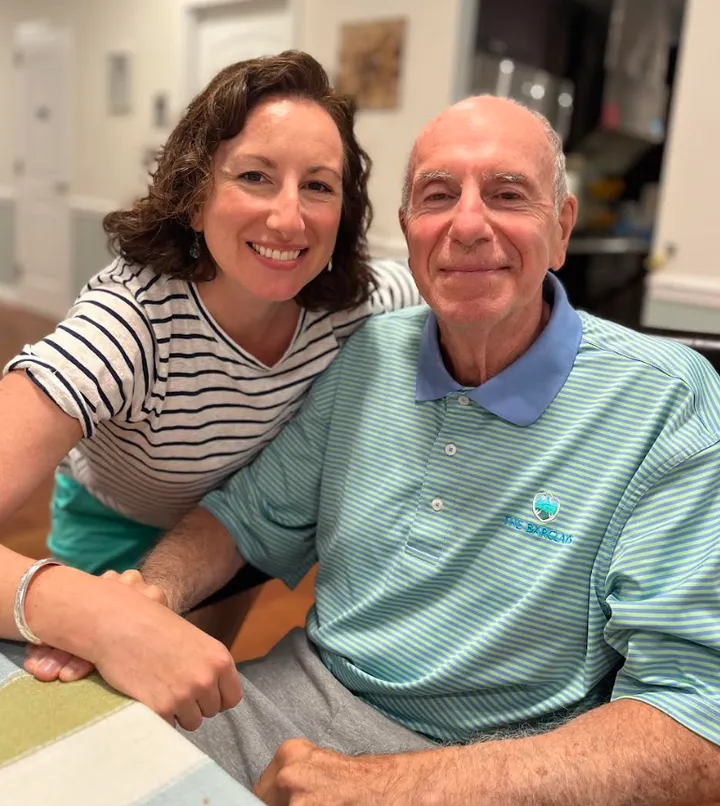Kate Ferranti describes her dad as compassionate, calm, and beloved by everyone who meets him. She says that she and her dad have always been extremely close, with many of her skills, likes, and interests coming from him and what he taught her. Sadly, at 75, she is enduring the painfully slow goodbye of watching Lewy Body Dementia wither away her father’s brain. Instead of being able to soak in all the precious moments she has left with her father, she is spending her time stressing over paying for her father’s care and worrying about her mother’s financial future. Why? Because Medicare doesn’t consider dementia a medical issue and, therefore, does not cover it.
Medicare Does Not Cover Dementia Costs

When her father received his diagnosis of Dementia, not one of the doctors that they saw gave any indication that Medicare would not cover any future care he might need. When it came time that Kate and her mother were no longer qualified to give her father the care he needed, Kate reached out to Medicare to get help covering his memory care home costs. She received a seven-word response that completely baffled her:
“We don’t consider dementia a medical issue,”
Kate struggled to understand how this could be true. She explained that her father was unable to clean himself, go to the washroom, change his clothes, take his medications, or walk without assistance. His capacity to put together logical sentences had all but disappeared. He needed constant care and could not be left alone. Not only was her mother’s energy and mental health depleting trying to take care of her husband, but she, nor Kate, was no longer qualified to give him the care he needed. The only option was a memory care facility, which cost them over $8000 per month.
Read More: ‘Eye-opening’ Dementia Breakthrough Announced by USC Researchers
Getting The Conversation Started

American families are in a crisis, and conversations, she says, need to start happening. Kate has a few ideas as to what needs to happen first. She wrote the following in her article published on Huff Post Personal:
First, neurologists should mention financial planning at the onset of disease — especially when dementia can hit people in their 50s, 60s and 70s. My father saw two doctors, and neither mentioned long-term care or offered the help of a social worker. When I asked the second doctor about the prognosis, he brushed me off, saying, “My advice is to go home and live each day. Your father seems like a happy guy.” When I later asked about home care, he told me to “Google Visiting Angels.”
Because brain diseases are mysterious, doctors will not predict how long my father will live (and therefore, how much money is necessary). But doctors should warn families of the financial challenges particular to dementia care, especially when there is a spouse. There is living to plan for, even if that feels perverse while dying is taking place.
Second, policymakers should reconsider how Medicare can better support dementia patients. Classifying the care needs as non-medical companionship, especially in the later stages of the disease, is terribly misguided.
Recently, my father lost his ability to walk and feed himself; we are told the next phase could be forgetting how to swallow. The brain is our most vital organ — if it doesn’t work, that is a medical issue affecting the whole body. My father is in a memory care facility where nurses and other staff trained in dementia provide treatment 24 hours a day. Families can provide assistance, but only to a certain degree.
Finally, middle-class families should plan for aging, sickness, and death, even though it’s hard to discuss. Having some basics in place — wills, powers of attorney, health care proxies, a trust for a home before a disease is too far along — is a good first step and way of starting a conversation.
Further, families should understand what long-term care covers and its costs. The average cost of memory care in New Jersey, where my parents live, is an astounding $8,150 a month. Those of us in middle age should start to plan for ourselves, especially since long-term care insurance is no longer viable for most people due to outrageously high premiums and caps on coverage. (1)
The Problem With Medicare

Medicare, the federal health insurance program primarily designed for Americans aged 65 and older, provides crucial medical coverage for millions of individuals and families. While Medicare has undoubtedly benefited many middle-class families, it is not without its flaws. One significant issue that often goes unnoticed is Medicare’s failure to adequately recognize dementia as a medical problem and provide comprehensive coverage for its treatment. Let’s shed some light on this issue, focusing on the implications for middle-class families and the options available to them when faced with a dementia diagnosis. (2)
The Neglect of Dementia

Dementia, a progressive neurodegenerative syndrome characterized by the loss of cognitive functions, affects a significant portion of the elderly population. Despite its impact on the lives of both patients and their families, Medicare fails to recognize it as a medical problem deserving comprehensive coverage. While Medicare does cover some services related to memory care, the scope of coverage is often limited and insufficient to meet the needs of those diagnosed with dementia.
Read More: Think Positive: Your Negative Thoughts Are Linked To Dementia Later In Life
Implications for Middle-Class Families

- Financial Burden: The lack of comprehensive Medicare coverage for dementia places a significant financial burden on middle-class families. Families may be required to pay out-of-pocket for expensive procedures, medications, and long-term care, putting a strain on their finances and potentially jeopardizing their overall financial stability.
- Caregiver Stress: Dementia caregiving can be physically and emotionally draining, often requiring full-time attention and specialized care. Medicare’s limited coverage may result in families having to shoulder the burden themselves or seek alternative, often costly, long-term care options. This added responsibility and financial burden can amplify stress and negatively impact the well-being of the entire family.
Options and Preparations for Families

- Long-Term Care Insurance: Middle-class families should consider investing in long-term care insurance before a dementia diagnosis occurs. Such an insurance policy can help mitigate the financial impact of extended care, including nursing homes, memory care units, and in-home supportive services.
- Medicaid: Families should explore Medicaid, a joint federal and state program, as an option to bridge the gaps left by Medicare. Medicaid provides coverage for long-term care services and may allow families to access additional benefits for dementia care.
- Caregiver Support: Seek support from organizations and resources that cater specifically to dementia caregiving, such as support groups, respite care, and training programs. These resources can help alleviate caregiver stress and provide invaluable guidance and understanding in navigating the complexities of dementia care.
- Advanced Care Planning: Every family should engage in conversations about advanced care planning, including legal and financial matters, while their loved ones are still capable of making decisions. This may involve appointing a durable power of attorney for healthcare and creating legally binding documents such as living wills and medical powers of attorney.
The Bottom Line

Medicare’s failure to recognize dementia as a medical problem and provide comprehensive coverage poses significant challenges for middle-class families faced with a loved one’s dementia diagnosis. The financial burden and lack of specialized care options can exacerbate the stress already associated with caregiving.
However, by exploring alternatives such as long-term care insurance and Medicaid, seeking caregiver support, and engaging in advanced care planning, families can navigate these challenges more easily and ensure their loved ones receive the best care possible. While advocating for changes to Medicare’s coverage of dementia remains crucial, proactive preparation and collaboration with various available resources can help middle-class families overcome the obstacles presented by the current system.
Read More: How These Greek Islanders May be Avoiding Dementia

